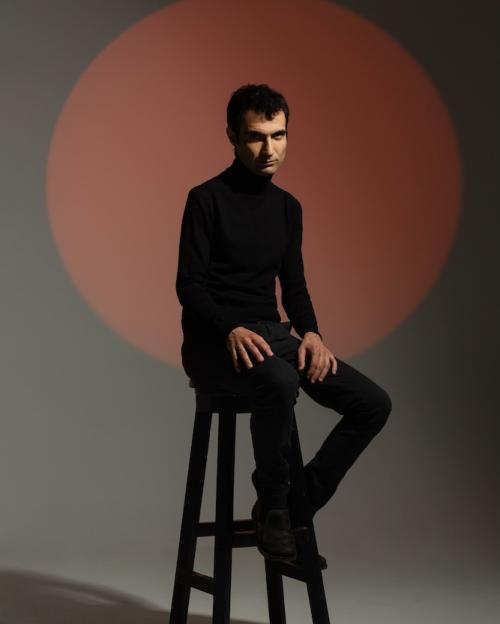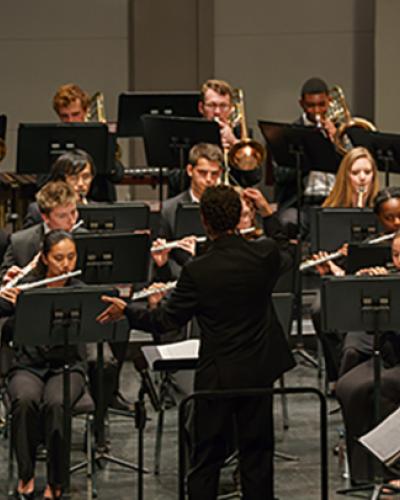The Cornell Wind Symphony performed this past Sunday in Bailey Hall at 3pm; the concert centered around Charles Ives’ “Variations on America.” I sat down with conductor James Spinazzola to talk about the repertoire for this performance.
“The Wind Symphony is performing at Yale in March as part of the Eastern Division Conference of the College Band Directors National Association. And Ives went to Yale, so I thought it would be fun to prepare one of our pieces in advance and do something of Ives’. “Variations on America” is certainly one of his most well-known works. It’s a very early work for him, but it’s [also] one of those that has stood the test of time.”
Spinazzola originally intended Ives’ work to be the standalone centerpiece of the upcoming performance, but that all changed over the past summer when he came across music written by former Cornell faculty member David Borden in the 1960s.
“I spent some time listening to old LPs of the Concert Band (now the Wind Symphony) at Cornell from the 1970s. And although David Borden wrote his variations on the Ives variations for the Ithaca High School band, it was subsequently recorded for the Cornell Concert Band. And so I listened to the recording and thought it was a terrific work, and it hasn’t been played, to my knowledge, in years, anywhere… Fortunately, David Borden still lives here in town.”
“[David] gave me the old parts- they’re essentially illegible at this point, they’ve sort of dissolved, but the score was good. We [transcribed] the score with music notation software and edited it for our particular instrumentation, so we’re just going to present a new version.”
David Borden is a groundbreaking composer and a pioneer of electroacoustic music who founded and directed the Digital Music Program (now the Cornell Electroacoustic Music Center) until his retirement as Senior Lecturer in 2005. Borden’s variations on Ives’ variations are, according to Spinazzola, the composer’s way of commenting on the tumultuous years of the late 1960s. Spinazzola said he feels that the socio-political parallels between Borden’s day and now are extremely uncanny, and how tragically thought-provoking this historical awareness is.
“[Borden’s] recording that goes along with the piece captures beautifully the time in which he was living. He’s got clips of advertisements, he’s got news footage of Martin Luther King speaking, of Robert Kennedy speaking, of Lyndon B. Johnson... the people who were making news at that time. Throughout the course of this piece he uses it as a musician’s... best attempt at nonviolent response to profoundly troubling events. It’s like a musical commentary, and he does it in a way that’s funny; he draws humor to it - which, let’s face it, how do we cope with things we can’t even understand? Sometimes you just have to look at the news and laugh, like “how is this happening?””
“I was already sort of thinking along these lines, thinking about what the United States is about these days, what’s going to be the fate of so many political institutions that have been perhaps irreparably changed over the last few months?”
“[S]o I just find it incredibly interesting, obviously in a tragic way. And I have to think, from speaking with David, that’s how he viewed his time as he was writing this piece. I mean, there has been no time in our nation’s history when so much happened in such a short time span, and I think he manages to capture that in a way that helps us realize that there were still good things happening at the time, and this was just one guy’s way of processing information in a healthy way. And for me the biggest thing is the parallels, they’re clear as day. And so we’ve just been talking about that a lot in rehearsal.”
We also spoke about the recent violence in Collegetown, and how Cornell students’ response mirrors events of the 1960s, specifically in reference to the Willard Straight Hall Takeover. Spinazzola then went on to talk about a violent protest against famed Austrian violinist Fritz Kreisler outside of his performance at Bailey Hall in 1917. He described rioting and an official call to boycott the performance from the mayor of Ithaca, with some protesters going so far as to cut the power to Bailey hall mid-performance.
“And of course, the line of the time was no different than the line we [are hearing] a hundred years later, “This is not what Cornell’s about, we aspire to something better, our founding members desired this to be an open institution, so we can’t condone that sort of behavior.” To hear that back then [at the close of World War One], it was anti-German sentiment. We know what it is now. To hear those words said, and then see that a hundred years later we’re essentially in the same place... that was another parallel that was, again, a depressing one. But it sort of [reminds] of what we all are responsible for at Cornell: to make this place what it should be.”
With an aura of reassurance, however, Spinazzola took solace in the fact that our music making will continue in its excellence, even with such uncertainty: “We’re all still doing what we do amid similarly tumultuous times.”
The Wind Symphony performs next on Friday, November 17 at 8pm in Bailey Hall. The concert is a collaboration with the Cornell Klezmer Ensemble and will feature a dance lesson at 7pm. The concert and dance lesson are free and open to the public.





